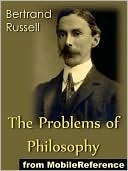More on this book
Community
Kindle Notes & Highlights
Thus our two questions may be re-stated as follows: (1) Is there any such thing as matter? (2) If so, what is its nature?
'Whatever can be thought of is an idea in the mind of the person thinking of it; therefore nothing can be thought of except ideas in minds; therefore anything else is inconceivable, and what is inconceivable cannot exist.'
All knowledge, we find, must be built up upon our instinctive beliefs, and if these are rejected, nothing is left.
But this, which a blind man can understand, is not what we mean by light: we mean by light just that which a blind man can never understand, and which we can never describe to him.
Thus the colour we see is a result of the ray as it reaches the eye, and not simply a property of the object from which the ray comes. Hence, also, provided certain waves reach the eye, we shall see a certain colour, whether the object from which the waves start has any colour or not. Thus it is quite gratuitous to suppose that physical objects have colours, and therefore there is no justification for making such a supposition.
There is no state of mind in which we are directly aware of the table; all our knowledge of the table is really knowledge of truths, and the actual thing which is the table is not, strictly speaking, known to us at all.
All acquaintance, such as my acquaintance with the sense-datum which represents the sun, seems obviously a relation between the person acquainted and the object with which the person is acquainted. When a case of acquaintance is one with which I can be acquainted (as I am acquainted with my acquaintance with the sense-datum representing the sun), it is plain that the person acquainted is myself. Thus, when I am acquainted with my seeing the sun, the whole fact with which I am acquainted is 'Self-acquainted-with-sense-datum'. Further, we know the truth 'I am acquainted with this sense-datum'.
...more
For the probability that Socrates is mortal is greater, on our data, than the probability that all men are mortal.
Thus all truths involve universals, and all knowledge of truths involves acquaintance with universals.
The relation of resemblance, therefore, must be a true universal.
All a priori knowledge deals exclusively with the relations of universals.
The value of philosophy is, in fact, to be sought largely in its very uncertainty. The man who has no tincture of philosophy goes through life imprisoned in the prejudices derived from common sense, from the habitual beliefs of his age or his nation, and from convictions which have grown up in his mind without the co-operation or consent of his deliberate reason.
For this reason greatness of soul is not fostered by those philosophies which assimilate the universe to Man. Knowledge is a form of union of Self and not-Self; like all union, it is impaired by dominion, and therefore by any attempt to force the universe into conformity with what we find in ourselves.


